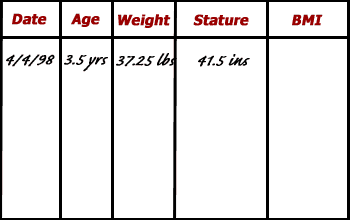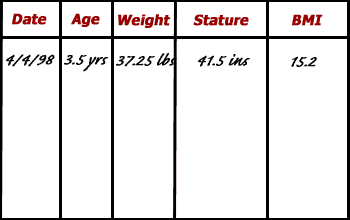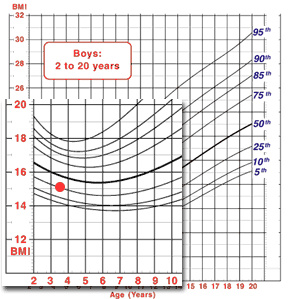Plotting and interpreting BMI-for-age by using the English system
A Case Study of 'Sam'
Step 1. Obtain accurate weights and height measurements
Date of Birth (DOB): 9/15/94
Date of Visit (DOV): 4/4/98
Weight: 37 pounds 4 ounces
Height: 41 1/2 inches
Step 2. Select the appropriate growth chart
Because Sam is a normal 3.5 years old, a standing height was obtained. The appropriate chart to use is the ‘Boys 2 to 20 BMI-for-age’ chart.
Step 3. Record the data
On the data entry table found on the clinical growth chart, information relevant to the growth chart is recorded. Here data has been recorded for the date of visit, the child’s age, weight and height at the visit.

Step 4. Calculate BMI
Calculate BMI at the time of the clinic visit.
Calculations:
Convert ounces and fractions to decimals:
Weight of 37 lbs and 4oz = 37.25 lbs (16 ounces = 1 pound so 4oz/12 oz = 0.25).
Height = 41.5 in.
BMI: (37.25 lbs/41.5 in/41.5 in) x 703 = 15.2
Then the BMI of 15.2 is entered on the data entry table

Step 5. Plot measurements
All the necessary information is recorded and Sam’s BMI can be plotted. On the BMI-for-age chart, find Sam’s age on the horizontal axis and visually draw a vertical line up from that point. Then find his BMI on the vertical axis and visually draw a horizontal line across from that point. The point where the two intersect represents Sam’s BMI-for-age.
When plotted on the growth chart, Sam’s BMI-for-age falls just below the 25th percentile curve.

Step 6. Interpret the plotted measurements
Since Sam’s BMI-for-age falls just below the 25th percentile curve, this means that of 100 children with the same sex and age as Sam from the reference population, fewer than 25 children would have a BMI-for-age lower than his and more than 75 have a BMI-for-age higher than his. Sam is not obese, overweight, or underweight. When a child’s plotted measurement falls between the 5th and 85th percentiles it is considered to be a healthy weight. Sam’s BMI-for-age is a healthy weight based on this measurement.
- Page last reviewed: March 10, 2016
- Page last updated: March 10, 2016
- Content source:


 ShareCompartir
ShareCompartir